| Srl | Item |
| 1 |
ID:
108664
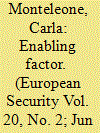

|
|
|
|
|
| Publication |
2011.
|
| Summary/Abstract |
The article analyzes the influence of US-EU cooperation on the UN decision-making process in the area of peace operations and its impact in the period 1991-2008. The article claims that US-EU cooperation transforms the positional power of the US, the EU and its member states into a coalition with dominant influence in the area of UN peace operations and becomes an enabling factor for the authorization of UN peace operations.
|
|
|
|
|
|
|
|
|
|
|
|
|
|
|
|
| 2 |
ID:
108663
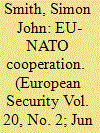

|
|
|
|
|
| Publication |
2011.
|
| Summary/Abstract |
Although EU-NATO institutional relations have been evolving since the Saint-Malo Declaration in 1998, efficient and coherent cooperation is still lacking. This article goes beyond the narrative of blockage caused purely at the political level in order to illustrate both formal and informal EU-NATO cooperation at both the centre (Brussels) and on the ground (missions). This article addresses cooperation in terms of the actors involved at three different levels: state actors, international staff, and military personnel. Although, much has been done to advance cooperation between international staffers in Brussels and between those on the ground in common mission areas, the lack of a political agreement - one that moves beyond the limited scope of Berlin Plus - is causing severe fatigue, most notably at the level of international staff. Furthermore, the informal and ad hoc cooperation that has been the underlying facilitator of synergy between the two organisations could start to atrophy if a grand or intermediary bargain is not achieved in the near future.1
|
|
|
|
|
|
|
|
|
|
|
|
|
|
|
|
| 3 |
ID:
108658
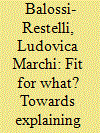

|
|
|
|
|
| Publication |
2011.
|
| Summary/Abstract |
The thrust of this paper concerns the case of the European Battlegroup (BG) non-deployment in late 2008, when the United Nations requested European military support for the United Nations Organisation Mission peacekeeping force in the Democratic Republic of the Congo (DRC). The argument is built on the fact that when, in official documents, the EU approaches the European security and ESDP/CSDP's military crisis management policy and interventions, it makes strong references to the United Nations and the UN Charter Chapter VII's mandate of restoring international peace and security. Such references make it seem that supporting the UN when it deals with threats and crises is a primary concern of the EU and the member states. These allusions lead to the main contention of this paper, that there is much ambivalence in these indications. The paper develops its argument from one key hypothesis; namely, that the non-deployment of a European BG in the DRC, at the end of 2008, constitutes a useful case study for detecting a number of ambiguities of the EU in respect of its declarations in the official documents establishing the European military crisis management intervention structure.
|
|
|
|
|
|
|
|
|
|
|
|
|
|
|
|
| 4 |
ID:
108659
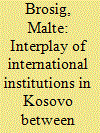

|
|
|
|
|
| Publication |
2011.
|
| Summary/Abstract |
This article examines the interplay of international institutions in Kosovo and aims at disentangling and explaining the emergence and persistence of this international 'interim' regime. In 1999, the UN mission to Kosovo (UNMIK) and the Organisation for Security and Cooperation in Europe (OSCE) were the leading institutions in the civilian area following NATO's deployment of Kosovo Force (KFOR). Following the failed status talks on Kosovo, the EU's rule of law mission (EULEX) and the establishment of an International Civilian Office (ICO) have been set up in addition for increasing institutional complexity. The article analyses how institutional complexity is emerging and what strategies international institutions are applying when confronted with policy overlap. The paper finds that the emergence of institutional complexity in Kosovo is largely a result of historical lock-in effects. International institutions have developed two dominant strategies to cope with dense institutional spaces. First, they show signs of a functional convergence and a coordinated pooling of resources. Second, institutions have developed niche competences to avoid competition.
|
|
|
|
|
|
|
|
|
|
|
|
|
|
|
|
| 5 |
ID:
108661
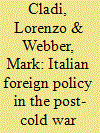

|
|
|
|
|
| Publication |
2011.
|
| Summary/Abstract |
Drawing on a neoclassical realist approach, this article analyses the foreign policy conduct of different Italian governments from 1994 to 2008. Pressured by the post-cold war international system, these governments have been compelled to raise Italy's profile within the international system. However, the way in which successive governments have responded has differed markedly. By looking at variables located at the domestic level - elite perceptions of the distribution of power and government instability - it is possible to explain these differences. Neo-classical realism is seen as an advance on Waltzian neo-realism precisely because it allows room for domestic as well as international (or systemic) variables, and because it has a very specific focus on foreign policy as such.
|
|
|
|
|
|
|
|
|
|
|
|
|
|
|
|
| 6 |
ID:
108662


|
|
|
|
|
| Publication |
2011.
|
| Summary/Abstract |
European leaders frequently vaunt the European Union's distinctiveness in adopting and pursuing a comprehensive approach to security. The EU's profile as an international actor is designed to span across all dimensions of security. As a result, its security policy portfolio involves a large number of institutional actors and policies that need to be coordinated. The ambition of the EU to provide security in a comprehensive manner raises challenges at the politico-strategic level, at the level of operational and policy planning and in day-to-day implementation. So far, the field is lacking an inclusive analytical framework for the analysis of providing security through a distinctively comprehensive civil-military, economic and political organisation. This article seeks to close this gap by providing suggestions for how the wide range of issues related to comprehensive security could be structured, and by framing the matter theoretically and with reference to existing conceptual work and empirical research.
|
|
|
|
|
|
|
|
|
|
|
|
|
|
|
|